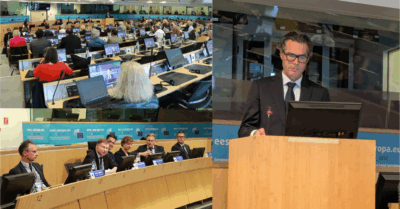Sira Consulting and Y.digital deliver AI Instrument Report on cutting red tape to the European Economic and Social Committee and EU commissioner Valdis Dombrovskis
To accelerate the EU competitiveness agenda we delivered our report “A Business-Centric Approach to Cutting Red Tape – From Complexity to Clarity: Reducing EU Regulatory Burdens with AI,” with the participation of commissioner Valdis Dombrovskis.
The report includes an AI-instrument to assess and measure regulatory burden (RB-Index) to compare, simplify and reduce regulatory burden and built a more competitive, dynamic ad productive EU. The report and underpinning instrument were commissioned by the EESC Employers’ Group.
Our shared goal was to demonstrate how artificial intelligence can serve as a powerful tool in reducing regulatory burdens across the EU, particularly for small and medium-sized enterprises (SMEs).
Drawing on our deep expertise in Regulatory Burden (Sira) and AI, RegTech, and digital transformation (Y.digital), we applied a structured, data-driven approach to assess regulatory growth, evaluate the current Better Regulation framework, and propose intelligent, actionable improvements for European policymaking.

Despite longstanding simplification efforts, the volume and complexity of EU regulations continue to rise, placing increasing administrative pressure on businesses. Through the development of advanced AI models, a custom Regulatory Burden Index (RBI), and targeted stakeholder engagement, this study provides a practical blueprint for smarter and more responsive regulation in Europe.
The research includes an AI-based assessment of regulatory expansion, the development of monitoring tools to extract compliance obligations from legal texts (Eur-Lex), the design and testing of a Regulatory Burden Index, and a series of policy recommendations validated through stakeholder interviews.
The findings show that even well-supported EU policies can lead to unintended burdens when they do not align with real-world business processes. The RBI and the SME Indicator Company Approach offer concrete tools to identify, monitor, and reduce such burdens in real time.
To make EU regulation more effective and business-friendly, the study recommends implementing the RBI to track and prevent excessive burdens, strengthening the Better Regulation framework with measurable targets, enabling more adaptive legislation to reduce compliance uncertainty, and harmonising implementation across Member States to improve predictability.
By integrating AI into the regulatory process, the EU can streamline legislation in a way that supports innovation, competitiveness, and sustainability without increasing complexity.
What this study delivers is more than just another diagnosis of regulatorychallenges. It presents a practical, data-driven toolkit that offers a clear way forward.
With AI, we now have the ability to identify what entrepreneurs have long felt: where regulation is too heavy, unclear, or duplicative. AI can read through legislation, flag pain points, and allow for comparisons across sectors and Member States.
This gives us a real opportunity to move Better Regulation from an abstract principle to a tangible competitive advantage – one that enables faster, simpler, and more effective policymaking, aligned with the realities of today’s economy.
Most importantly, it can help Europe lead not only in setting global standards but in designing rules that truly empower growth, sustainability, and inclusion.
We look forward on taking this forward with the EESC Employers’ Group and the commissioner.
Read the full study here: A Business-Centric Approach to Cutting Red Tape | EESC
Is your organization dealing with complex legislation and compliance challenges?
Sira Consulting offers (AI-powered) solutions that help businesses and citizens reduce compliance costs, manage regulatory complexity, and operate with greater agility.
Contact peter.bex@siraconsulting.nl to explore how we can support your organization.
